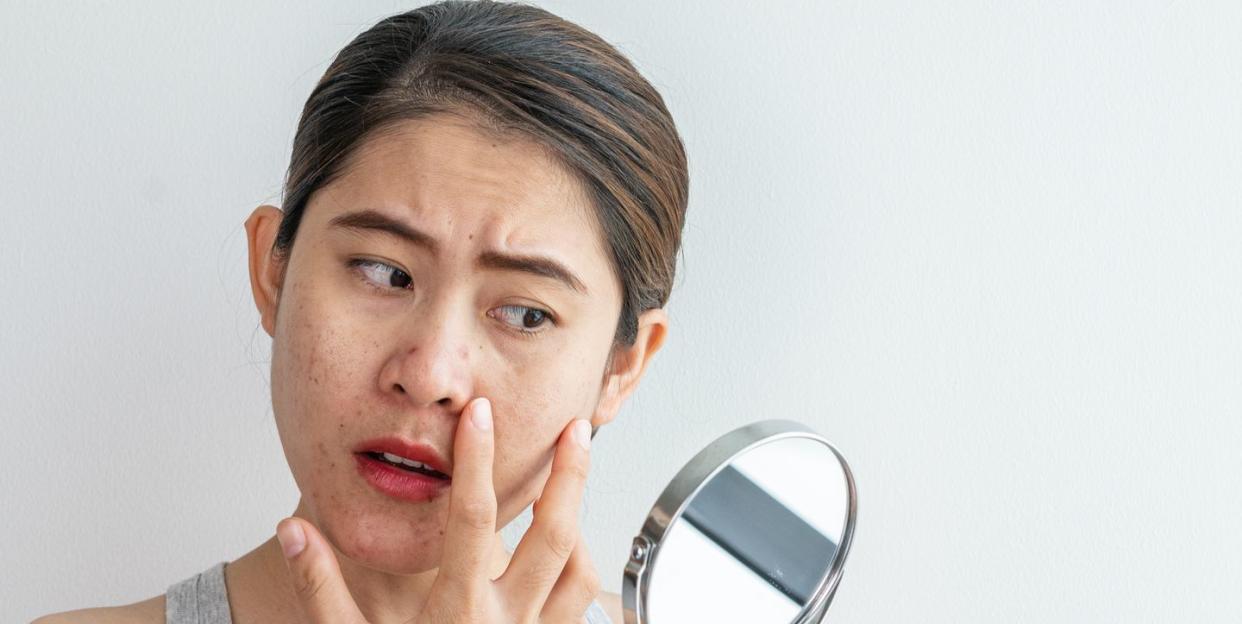How to Get Rid of Blind Pimples Once and for All, According to a Dermatologist

"Hearst Magazines and Yahoo may earn commission or revenue on some items through the links below."
Few things toy with a person’s self-confidence quite like a breakout. While some blemishes make themselves known (whiteheads, for instance), a blind pimple lurks beneath the surface of the skin, causing an often painful bump. While it might be tempting to squeeze the inflamed red mound—don’t. There are better ways to get rid of blind pimples that won’t leave you scarred and in search of the best concealer.
Ahead, Corey L. Hartman, M.D., board-certified dermatologist and Founder of Skin Wellness Dermatology in Birmingham, AL breaks down everything to know about blind pimples, including how to treat them and how to prevent them in the first place.
What is a blind pimple?
“A blind pimple is an inflamed cyst that forms deep beneath the surface of the skin, never making an appearance on the surface of the skin like a blackhead or a whitehead (hence the blind pimple name),” says Dr. Hartman. You can get a blind pimple anywhere on the body, and while they vary in size, they all typically feel like a hard bump under the surface of the skin.
In fact, a blind pimple is a form of inflammatory acne. Dr. Hartman explains that oftentimes, “blind pimples can feel irritated and tender to the touch, sometimes even painful due to the inflammation caused by the pimple infringing on nearby nerves.”
Blind pimple causes
Blind pimples are caused when excess sebum mixes with dead skin cells and bacteria, essentially creating a clog, explains Dr. Hartman. “It’s the same causes as cystic acne—the main difference being that blind pimples will never make it to the surface of the face like most cystic acne will.”
Blind pimples are also triggered by hormones, says Dr. Hartman, so it’s possible that people who menstruate or are receiving hormone therapy may see an increase in blind pimples that track with the menstrual cycle or the hormone therapy.
How to get rid of a blind pimple
Many blind pimples will often resolve on their own. However, Dr. Hartman notes that this can sometimes take a few weeks, which often feels too long for many patients, especially if they are painful to the touch.
“You can reduce the pain by using a cold compress at the site a couple times a day, or apply 1% hydrocortisone cream onto the spot where the blind pimple is,” he explains. Hydrocortisone can help reduce inflammation.
“You do not want to try to squeeze a blind pimple out,” Dr. Hartman warns. “Squeezing will actually trigger more of an inflammatory response and make a blind pimple worse….if you can live with the pimple, continue with your regular skincare routine and within a few weeks you should notice that it is getting smaller or going away.”
How to prevent a blind pimple
The best way to prevent blind pimples is to have a consistent skincare routine. And according to Dr. Hartman, your daily skincare regimen doesn’t need to be complicated; “you want a routine that will cleanse, moisturize, and protect the skin, along with one or two additional steps to help regulate sebum production and reduce the amount of bacteria on the skin’s surface, especially if you are acne prone.” He notes that benzoyl peroxide face wash is a good option to incorporate into your a.m. routine, “and I always recommend a retinol, or even better yet, a retinoid.”
If you notice that you are seeing more blind pimples associated with an influx of hormones, a.k.a. your period, there are birth control options and other medications that may help regulate those hormone influxes to help manage, says Dr. Hartman.
When to see a professional
If you are in pain, or you need a blind pimple gone quickly, it’s time to see an expert. Dr. Hartman says that your dermatologist “can inject cortisone into the pimple, which will minimize inflammation and shrink the pimple.” Blind pimples treated with a cortisone shot usually heal in about one-to-two weeks.
If you get blind pimples often, meaning more than once a month, Dr. Hartman says you should talk to your dermatologist about a prescription topical regimen, either a retinoid or another prescription topical.
You Might Also Like

